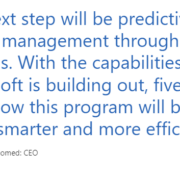Personalized Care: Tailoring Treatment to Individual Needs
In the evolving landscape of healthcare, the concept of personalized care has emerged as a beacon of hope for improving patient outcomes and enhancing the overall healthcare experience. At Arthur Health, our mission is to transform healthcare through patient-centered care, care coordination, and integrated clinical networks. Personalized care aligns seamlessly with this mission, as it emphasizes the importance of tailoring treatment to meet the unique needs of each individual. This approach not only addresses the diverse challenges faced by patients but also empowers healthcare professionals to deliver more effective and compassionate care.
Despite the advancements in medical technology and treatment options, many patients still encounter a one-size-fits-all approach to healthcare. This can lead to misdiagnoses, ineffective treatments, and a lack of engagement in their own health journey. For healthcare professionals, the challenge lies in navigating the complexities of individual patient needs while ensuring that care is both efficient and effective. For patients and their families, the struggle often involves feeling unheard or misunderstood in a system that seems impersonal. Healthcare payers and insurers face the challenge of balancing cost-effectiveness with the need for personalized care, while policymakers and industry leaders must grapple with creating frameworks that support this transformative approach. By addressing these pain points, we can pave the way for a more responsive and patient-centered healthcare system.
The Importance of Personalized Care
Personalized care, also known as precision medicine, involves tailoring medical treatment to the individual characteristics of each patient. This approach considers a variety of factors, including genetics, lifestyle, environment, and personal preferences. By focusing on the individual, healthcare providers can develop more effective treatment plans that not only improve health outcomes but also enhance patient satisfaction.
- Genetic Insights: Advances in genomics have enabled healthcare providers to understand how genetic variations affect individual responses to medications and treatments. For instance, pharmacogenomics allows clinicians to prescribe medications based on a patient’s genetic makeup, reducing the risk of adverse drug reactions and increasing the likelihood of treatment success.
- Patient Engagement: Personalized care fosters a collaborative relationship between patients and healthcare providers. When patients feel that their unique needs and preferences are acknowledged, they are more likely to engage actively in their treatment plans, leading to better adherence and outcomes.
- Holistic Approach: Tailoring care to individual needs involves looking beyond just the physical symptoms. It encompasses mental, emotional, and social factors that influence health. For example, a patient with chronic pain may benefit from a multidisciplinary approach that includes physical therapy, counseling, and lifestyle modifications.
Real-World Examples of Personalized Care
Several healthcare organizations have successfully implemented personalized care models, demonstrating the potential for improved patient outcomes and satisfaction. One notable example is the use of personalized cancer treatment plans. Institutions like the MD Anderson Cancer Center utilize genomic profiling to identify specific mutations in tumors, allowing oncologists to select targeted therapies that are more likely to be effective for each patient. This approach has led to significant improvements in survival rates and quality of life for cancer patients.
Another example can be found in the management of diabetes. Programs that incorporate continuous glucose monitoring and personalized dietary plans have shown promising results. By analyzing individual glucose patterns and dietary habits, healthcare providers can create tailored interventions that help patients achieve better glycemic control, ultimately reducing the risk of complications.
Challenges and Opportunities in Implementing Personalized Care
While the benefits of personalized care are clear, several challenges must be addressed to fully realize its potential. One significant barrier is the integration of data across various healthcare systems. Effective personalized care relies on comprehensive data sharing among providers, which can be hindered by fragmented electronic health records (EHRs) and varying standards of data collection.
Additionally, there is a need for ongoing education and training for healthcare professionals to ensure they are equipped to implement personalized care strategies effectively. This includes understanding the latest advancements in genomics, data analytics, and patient engagement techniques.
Despite these challenges, the opportunities for improvement are vast. By investing in integrated clinical networks and care coordination, healthcare organizations can create a more cohesive approach to personalized care. This not only enhances the patient experience but also streamlines workflows for healthcare providers, ultimately leading to better resource utilization and cost savings.
Conclusion
Personalized care represents a paradigm shift in healthcare, moving away from a one-size-fits-all model to one that recognizes and values the individuality of each patient. By embracing this approach, healthcare professionals can improve treatment outcomes, enhance patient satisfaction, and foster a more engaged patient population. At Arthur Health, we are committed to improving healthcare delivery and patient outcomes through innovative solutions that prioritize personalized care.
As we continue to navigate the complexities of modern healthcare, we invite healthcare professionals, patients, families, payers, and policymakers to join us in this transformative journey. Together, we can create a healthcare system that truly meets the needs of every individual. To learn more about how Arthur Health is leading the way in personalized care and integrated clinical networks, we encourage you to explore our solutions and engage with us further.









